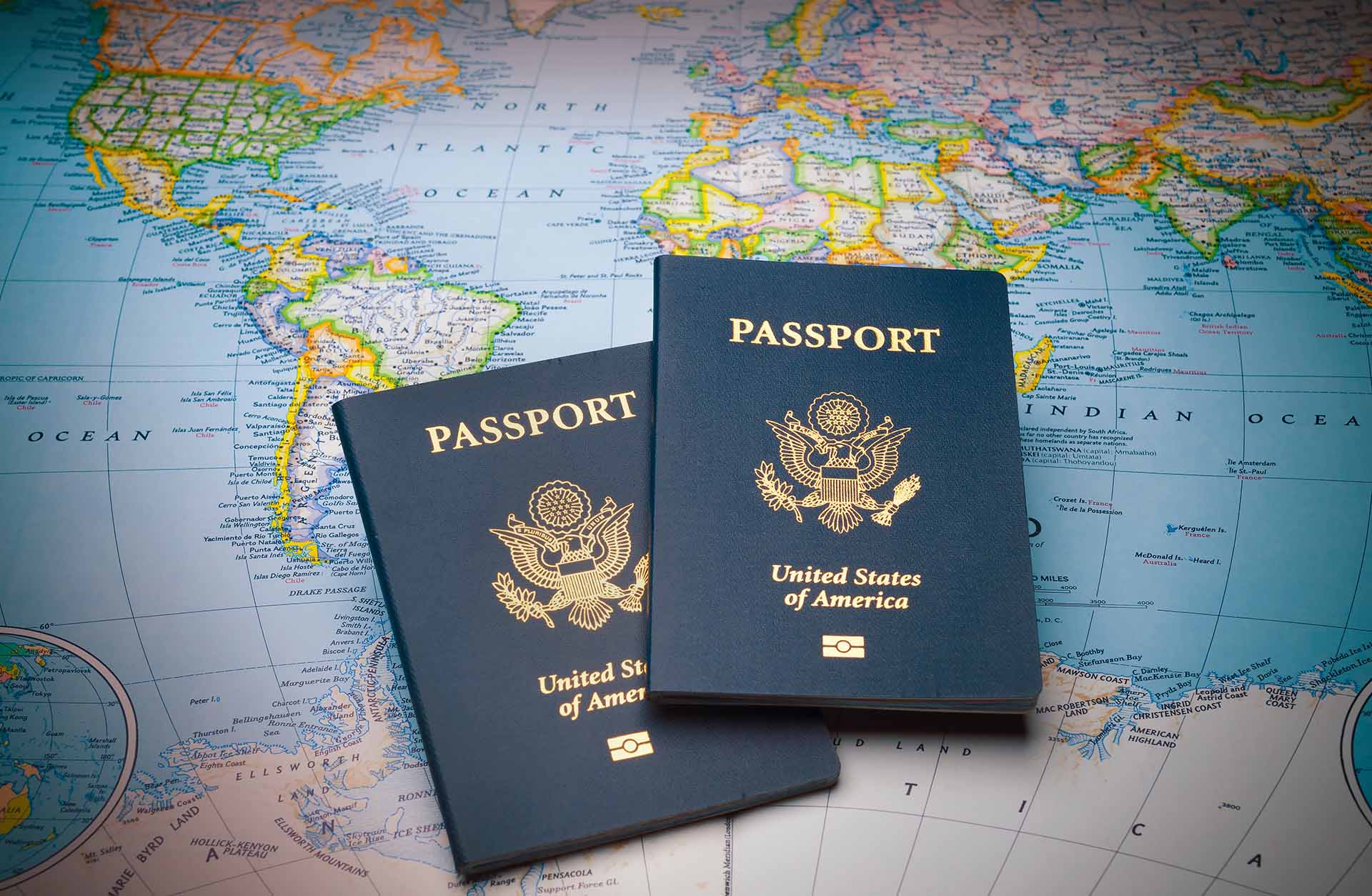If you are looking for an overseas destination to start a new chapter of your life, you may stop looking. Moving to Singapore will probably tick every box in checklists of all soon-to-be expats. The economy is healthy, salaries are high, taxes are low, and the city is bursting with life and activity.

The tiny state, one of the original “Asian tigers,” is regularly rated among the cleanest and the safest in the world. It has its quirks, though. For example, like some other former British colonies, Singaporeans drive on the left side. And it’s damn hot since the country lies almost on the Equator. Therefore, it is safe to leave all your black clothes behind when packing for an overseas move.
Basic Info and the Documents Required for Moving to Singapore From the USA
Being on the other end of the world, you might be put off by the prospect of having to break the language barrier. Well, write that off. English is one of the four official languages, and it is the main language of the public administration, and also in schools. Other official languages are Mandarin Chinese, Malay, and Tamil. You don’t have to speak any of them to have a functional life, but learning a language abroad will certainly make your experience richer. The local currency is the Singapore Dollar (SGD), and it trades for around 0.70 US dollars.
To obtain a Singaporean visa and work permit, you must have a job offer. What type of visa you will get is mostly based on your salary. Since laws regarding employment are very important in this regard, we’ll come back to them in a moment. For now, you should know that there are different fees to be paid for each visa. Also, always make sure to have all other documents needed to travel abroad.

If You Plan on Relocating to Singapore, Note That Employment Laws Are Strict
As we said before, a work pass is required for all who wish to move to Singapore for a job. Acquiring a work permit or visa may seem like a complicated procedure. First of all, as a prospective expat, you must present a document that proves that you have a workplace waiting for you when applying, the so-called “offer in principle.”
There are many types of working visas, and which one you may apply for depends on your salary and qualifications. For managerial and other high paid positions, there’s Employment Pass, while lower-paid positions are covered with different kinds of work permits. Those who wish to live and do business as entrepreneurs, can do so, again with special permission for opening or conducting business.
It is important to mention here that whether your spouse and children may come with you heavily depends on the type of visa you got. Spouse, unless Singaporean, won’t be able to get a job without their own working visa.
Obtaining permission to work is not easy, but it is well worth all the troubles, as the next part of our guide will show you.

The Cost of Living Is High – So How to Reduce It After Moving Overseas?
Singapore is not a cheap place, as you might imagine. From housing to groceries, expats should be prepared to spend a lot of money.
Housing is more expensive than in most big cities across the world, both in terms of buying and renting. New York is, as usual, an exception, but London, Paris, Sydney, or even Dubai, are more affordable in that regard.
Food is also more expensive than in the cities that we chose for comparison. On the other hand, if you want to eat out you will fare much better (except, of course, in The Big Apple). The same goes for clothes and most consumer goods.
But to take a more positive note, salaries are pretty high and taxes are pretty low, so it can easily qualify as one of the best places to live overseas. Biggest employers are the financial sector and banks, but the IT sector and electronics are not far behind. Also, there are many opportunities for special offers and other ways to shop at much lower prices than they regularly are. Look them up, you won’t be disappointed.
So, as we just saw, expats are not in for a financial cruise. That is, unless they are permanent residents. There’s the best catch of the Singaporean system – you may apply to become a permanent resident on the day of your arrival with a visa (though, to be fair, without guarantee of getting the coveted status). With it, you will be eligible for significant subsidies for housing and healthcare, among other things. An exception to that is education. It is free for Singaporeans, but foreigners must pay fees, permanent residents or not.
And one last point. Cash is very rarely seen in streets and shops, for most Singaporeans prefer to pay with credit cards.
Want a Car After Moving Abroad? Think Again
Owning a car is generally a good thing. It shortens traveling time and gives a sense of independence. As a foreigner, you are not prohibited from driving. You can either take your car with you by hiring overseas vehicle shipping or buy a new one when you arrive. Yet, it is not something advisable, unless really necessary.
The public transportation system is good, and it saw some large investments in recent years. The city is covered in a network of trains and buses. The government’s policies in that domain are created in such a way to discourage people from owning cars. The ticket cost is very low, and if you enter the train early enough, you‘ll ride for free.
Cars, on the other hand, cost much, much more so than in Europe, for example. After the acquisition of a vehicle, you will have to pay registration fees in the same amount, if not more. Thanks to the high costs of registration and maintenance, Singaporeans own fewer cars than many of their counterparts in developed countries.

What to Do Once Your Move to Singapore?
As can be expected of a diverse melting pot of cultures that Singapore is, you will discover lots of new things. From noodles upwards. Living there will enrich your life in so many ways.
On the cultural front, you may visit a number of museums dedicated to South-East Asian traditional and contemporary art.
The music scene is also vibrant, from classical music and folk to pop and rock.
Still, what locals are most proud of are the different cuisines and countless variations of them. Local cooking is often cited as one of the main reasons why you should visit the country. You can eat in the open air “Hawker centers,” heirs of traditional stalls, in the coffee shops and more or less fancy restaurants.
The most popular sports are, no surprise there, connected with water – swimming and sailing. Singaporean swimmer Joseph Schooling won the gold medal in the 2016 Olympics in front of one Michael Phelps.
And there are great opportunities for travel. Though there are beautiful sights in the city, such as Marina Bay Sands or Sentosa, the city is small, by any measure. Small it may be, but it sits in a circle of natural wonders. And there are endless opportunities for having fun. Once you get to the city’s airport, you are within three hours of countless adventures.
Let’s start with a single word – Bali. Tropical heaven for those who want to go to the paradise beaches, mountain hike trails, or nightlife that never sleeps. Temples and history of Cambodia and Thailand. Wildlife and rainforests of Malaysia, Indonesia, and the Philippines. All that just a few hours away.
However, while there is a lot of fun and games, there are also things that require serious consideration.
When Living in Singapore as an American, Be Mindful of Local Laws and Customs
Every country in the world has its own laws and customs. Some behavior that you might think of as completely ordinary may constitute an insult someplace else. It’s quite straightforward with the laws. You break the law, you get fined or even jailed. Customs are a different league. They stem from society, while laws are created by the state. And you’ll want to fit into society.
Never cut a queue. Always address elderly people as uncles and aunts. Don’t tip. Don’t you ever leave your chopsticks upright in a bowl. Only time Singaporeans do that is during funerals. And these are just some of the things that you’ll get to know one way or another once you reach this tropical paradise. So do your research and try not to step on too many feet. Oh, and whatever you plan to do in the open, you have to get official permission. That’s the law.
What is Expat Life in Singapore Like – Common Expat-Related Questions
As we said before, even though you’re moving across the world, there’s no need to worry about the language, since English is spoken everywhere. The living standard is very high, and education is top-notch. In case you need help, know that there is an active expat community to help you settle, whether you’re in need of a guide or just someone to drink a pint or two. Be careful, though, alcohol is somewhat restricted in the island nation.
Another thing you might not be used to is censorship on TV and media. Again, fear not. Getting informed on the internet is quick and easy, without any hitches. Also, if you plan to relocate with your dog or any other pet, know that Singapore’s regulations on animals entering the country are very strict, too.
How to Move to Singapore From the USA? A Guide to Choosing an Overseas Shipping Company When Moving Internationally
For a relocation overseas, you’ll need a reliable moving company, such as I Love Moving International company, that offers the best services for your money. So take your time to research. Since international moving by air is usually too expensive, transporting your things abroad by sea is the more common option. Check out different offers and prices and compare them to get the best possible service for your money. Also, read reviews left by previous customers – they offer valuable insight into how a mover conducts business. Checking whether the chosen company is fully licensed and registered goes without saying.
Questions to Ask Before Moving to Singapore
Besides the basic info about the international mover and how much it charges for its services, it couldn’t hurt to learn some other things that may arise in due time. If it provides packing services at a reasonable price, it might seem a better option than some who don’t do that. The possibility of storage, shipment tracking, different container sizes or custom crating is also a big plus.

Perks of Moving to Singapore Outweigh the Costs
So, when you put it all together, you might as well be relocating to one of the best places overseas. That should be incentive enough. If your decision to go there is final, you won’t be sorry.
Whether you go alone, with your spouse, or with your family, you’ll find that your life has changed for the better and that you will like what you see in a place that will be your new home. Therefore, all you need to do is contact us – and secure yourself a stress-free international move.
FAQ
First and foremost, Singapore is known for its high cost of living, so it’s important to research the average costs of housing, food, transportation, and other expenses in the city. You’ll also want to familiarize yourself with Singapore’s culture and social norms, which are heavily influenced by Chinese, Malay, and Indian traditions. English is widely spoken, but it’s always helpful to learn some basic phrases in the local languages. Finally, make sure to obtain the necessary visas and permits before you arrive, and research any healthcare, education, or employment requirements that may be relevant to you.
Before hiring an overseas moving company, research the cost of living in Singapore and make a budget for your expenses. Look into housing options and consider whether you want to rent or buy a home. You should also research the various neighborhoods in Singapore to find one that fits your needs and preferences. Next, familiarize yourself with the local culture and customs, and learn some basic phrases in the local languages. Finally, make sure to obtain any necessary visas or permits, and contact an international moving company to arrange for transportation and storage of your belongings.
The cost of living in Singapore is generally considered to be high, especially compared to other countries in Southeast Asia. Housing costs are the most significant expense, with prices for apartments and houses in the city center being especially expensive – even more expensive than the famous metropolises in the USA. However, food and public transportation are relatively affordable. Other costs, such as healthcare and education, can also be expensive.
One of the best places to start is online, where you can search for apartments and houses on different websites. You can also seek the help of a real estate agent or property agency who can provide you with a list of available properties that meet your requirements. It’s important to consider factors such as location, budget, and transportation when searching for a place to live in Singapore. Many people choose to live in the central or western parts of the island, as these areas offer convenient access to public transportation and a wide range of amenities.
Some of the most popular areas for expats and locals alike include Orchard Road, Holland Village, Tiong Bahru, and the East Coast. Orchard Road is known for its luxury shopping and high-rise apartments, while Holland Village has a bohemian vibe and is home to many art galleries and restaurants. Tiong Bahru is a historic neighborhood with many pre-war buildings and trendy cafes and shops, while the East Coast offers a relaxed and laid-back atmosphere with beautiful parks and beaches. Other popular neighborhoods include Bukit Timah, Dempsey Hill, and Marina Bay, each with its own attractions and amenities.
The transportation system in Singapore is efficient, convenient, and safe. The Mass Rapid Transit (MRT) is a modern and extensive subway system that covers much of the island, with trains arriving at regular intervals throughout the day. The system is well-maintained and reliable, making it a popular choice for commuters and residents alike. Buses are also widely available and serve many areas that are not accessible by the MRT. Taxis and ride-sharing services such as Grab are readily available as well, although they can be more expensive than public transportation. Singapore also has an extensive network of bike paths, making cycling a popular and environmentally friendly option for short trips.
Singapore is a vibrant city-state that has something to offer for every type of traveler. Visitors can start by exploring the city’s iconic landmarks, such as the Merlion and Marina Bay Sands. The Gardens by the Bay is a must-visit attraction, with its futuristic Supertrees and stunning flora. For culture enthusiasts, there’s the historic district of Chinatown, the colorful temples of Little India, and the ornate Sultan Mosque on Arab Street. Foodies will love the hawker centers, offering an array of affordable and delicious local delicacies. Singapore also boasts a thriving nightlife scene, with rooftop bars, night markets, and music festivals. The city is also home to several family-friendly attractions, including the Singapore Zoo and Universal Studios Singapore.
Finding a job in Singapore can be a straightforward process if you know where to look. The first step is to research the job market in Singapore and identify the industries and companies that align with your skills and experience. You can search for job openings on various online job portals, such as LinkedIn, Indeed, and JobsDB. It’s essential to tailor your resume and cover letter to the Singaporean job market and ensure that you meet the necessary work permit requirements. Finally, be persistent and patient, as finding the right job in Singapore may take some time and effort.
Singapore has a tropical rainforest climate characterized by high humidity, abundant rainfall, and consistently warm temperatures throughout the year, with April and May being the hottest months, and December and January being the coolest. The city experiences two main monsoon seasons, the Northeast Monsoon from December to early March and the Southwest Monsoon from June to September. During these periods, rainfall is more frequent and can sometimes be heavy, leading to occasional flooding. Despite the occasional rain, Singapore is known for its year-round warm and sunny weather, making it an ideal destination for outdoor activities and tourism.
Singapore is a culturally diverse city-state with a rich heritage and a unique blend of traditions from its Chinese, Malay, Indian, and European influences. The lifestyle in Singapore is a fusion of modernity and tradition, with a strong emphasis on cleanliness, efficiency, and respect for community values. The country is known for its food scene, with an abundance of hawker centers, fine dining, and street food. Singapore is also a global financial center and a hub for technology and innovation. The people of Singapore are friendly and welcoming, with a strong sense of national pride and a commitment to multiculturalism. To fully experience Singapore’s culture and lifestyle, it’s essential to be open-minded, respectful, and willing to try new things.
Getting a driver’s license and registering a car in Singapore can be a complex process, but there are steps to follow. First, you must pass the Basic Theory Test (BTT) and then the Practical Driving Test (PDT) to obtain a driver’s license. The tests are conducted by the Traffic Police or private driving schools. Once you have your license, you need to register your car with the Land Transport Authority (LTA). You must also purchase car insurance and obtain a Certificate of Entitlement (COE), which is a permit that allows you to own and use a car in Singapore for a limited period. The COE is obtained through a bidding system, and the price can be high due to the limited number of permits available. There are also other fees and taxes involved in the process of registering a car in Singapore.
Some of the top primary and secondary schools in Singapore include Nanyang Primary School, Raffles Institution, Hwa Chong Institution, and the Singapore Chinese Girls’ School. For higher education, the National University of Singapore (NUS) consistently ranks among the top universities in Asia and the world. Other top universities in Singapore include the Nanyang Technological University (NTU), Singapore Management University (SMU), and the Singapore University of Technology and Design (SUTD). These universities offer a wide range of undergraduate and graduate programs, including business, engineering, science, and technology, among others. Additionally, there are several international schools in Singapore that cater to students from diverse cultural backgrounds.
One common mistake is underestimating the high cost of living in Singapore, which can come as a shock to newcomers. Another mistake is not understanding the country’s cultural and social norms, which can result in misunderstandings and social faux pas. Another mistake is assuming that English is the only language spoken in Singapore, as there are several official languages, including Mandarin, Malay, and Tamil. Finally, some people may not fully appreciate the country’s strict laws and regulations, which can result in hefty fines or even imprisonment for serious violations.
Singapore is a bustling city with a diverse population, which makes it an ideal place to meet new people and make friends. One way to connect with others is by joining social groups or clubs related to your interests, whether it be sports, music, or other hobbies. Attend events and festivals around the city, such as the annual Singapore Night Festival or the Singapore International Festival of Arts, to meet people with similar interests. Lastly, consider taking a class or workshop, such as a cooking class or language course, where you can meet people who share your interests while learning a new skill. With a little effort and an open mind, making friends in Singapore can be an enjoyable and fulfilling experience.
Moving to a new country can be challenging, and it’s common to experience difficulty adjusting to life in Singapore. If you find yourself struggling, it’s important to reach out for help. Consider joining a support group or seeking out a therapist who can provide guidance and support. Engaging in activities that you enjoy can also help you feel more connected to the city and its people. It’s also worth making an effort to learn about the local culture and customs after shipping overseas, which can help you feel more comfortable and better equipped to navigate your new surroundings. Above all, be patient with yourself and give yourself time to adjust. With effort and support, you can overcome the challenges of living in a new place and start to feel at home in Singapore.








